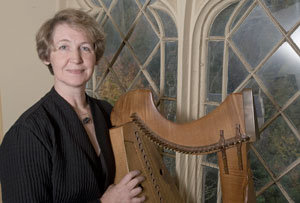 Alison Kinnaird is one of Scotland’s most influential musicians, the foremost exponent of Scottish harp music who has made an immense contribution to her instrument’s resurgence and popularity, and a teacher who has shared her knowledge with many of the leading harpers in subsequent generations.
Alison Kinnaird is one of Scotland’s most influential musicians, the foremost exponent of Scottish harp music who has made an immense contribution to her instrument’s resurgence and popularity, and a teacher who has shared her knowledge with many of the leading harpers in subsequent generations.
Born in Edinburgh on April 30, 1949, Alison began playing the cello at the age of seven and was a founder member of Edinburgh Youth Orchestra. But it was through a chance introduction to the Scottish harp at the age of fourteen that she discovered the music that was to become her calling.
In those days the Scottish harp was in danger of dying out. However, through her studies initially with Jean Campbell and then through researching old manuscripts as a Celtic studies undergraduate at Edinburgh University, Alison began to build a repertoire that would lead to her making, in 1978, the first-ever recording of tunes composed for the harp, The Harp Key, thus spearheading a revival that has gathered momentum over the years.
The Harp Key was followed in 1980 by Alison’s second album, The Harper’s Gallery, and then a series of music books, tutors and further recordings, all of which have proven invaluable to harp students all over the world. Alison has also played and taught harp throughout Scotland, the UK, in Europe and the USA, appearing at harp festivals and in concerts, and has recorded albums with fellow harper Ann Heymann, Gaelic singer Christine Primrose, Battlefield Band, and Irish flautist Seamus Tansey.
In the early 1990s Alison published the history of the harp in Scotland, The Tree of Strings, which she researched and co-wrote with Keith Sanger, and joined the Gaelic showcase group Mac-Talla, playing harp and cello alongside singers Christine Primrose, Arthur Cormack and Eilidh MacKenzie and keyboardist Blair Douglas.
All this time and up to the present music has been only part of Alison’s story, however, as she is also one of the world’s leading glass engravers, with work in public, royal and private collections throughout Europe, America and the Far East. Her pieces range from small intimate items to architectural installations and for many years she also provided the handsome, much coveted trophy for the BBC television quiz programme Superscot.
Her dual interests and expertise were recognised in 1997, when she was presented with an MBE for services to art and music, and in 2002, when a Creative Scotland award enabled Alison to create a project combining music and glass engraving, The Silver String, which was documented on CD and DVD and featured Alison on wire-strung, gut-strung and bray harps and cello.
Other awards and successes include winning the clarsach trophy at the National Mod and the harp competition at the Pan-Celtic Festival in Killarney, and in a particularly apt meeting of her talents, Alison gave an exhibition of her glass works at what was once the home of folk music in Edinburgh, The Howff, on the Royal Mile, in 1992. As she continues to set the highest example in performing traditional harp music and in tutoring young students, Alison Kinnaird is an inspiration whose pioneering work will ensure a lasting position of prominence in Scottish musical history.
Scottish Traditional Music Hall of Fame is run by
Hands Up for Trad.